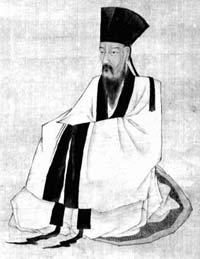Wang Yangming
| Wang Yangming | |||||||
 |
|||||||
| Traditional Chinese | 王陽明 | ||||||
|---|---|---|---|---|---|---|---|
| Simplified Chinese | 王阳明 | ||||||
|
|||||||
| Shouren (given name) |
|||||||
| Chinese | 守仁 | ||||||
|
|||||||
| Bo'an (courtesy name) |
|||||||
| Chinese | 伯安 | ||||||
|
|||||||
| Yangmingzi (art name) |
|||||||
| Traditional Chinese | 陽明子 | ||||||
| Simplified Chinese | 阳明子 | ||||||
|
|||||||
| Wencheng (posthumous name) |
|||||||
| Chinese | 文成 | ||||||
|
|||||||
| Shouren (given name) |
|||||||
| Chinese | 新建伯 | ||||||
|
|||||||
| Transcriptions | |
|---|---|
| Standard Mandarin | |
| Hanyu Pinyin | Wáng Yángmíng |
| Transcriptions | |
|---|---|
| Standard Mandarin | |
| Hanyu Pinyin | Shǒurén |
| Transcriptions | |
|---|---|
| Standard Mandarin | |
| Hanyu Pinyin | Bó'ān |
| Transcriptions | |
|---|---|
| Standard Mandarin | |
| Hanyu Pinyin | Yángmíngzǐ |
| Transcriptions | |
|---|---|
| Standard Mandarin | |
| Hanyu Pinyin | Wénchéng |
| Transcriptions | |
|---|---|
| Standard Mandarin | |
| Hanyu Pinyin | Xīnjiàn Bó |
Wang Yangming (31 October 1472 – 9 January 1529), courtesy name Bo'an, was a Chinese idealist Neo-Confucian philosopher, official, educationist, calligraphist and general during the Ming dynasty. After Zhu Xi, he is commonly regarded as the most important Neo-Confucian thinker, with interpretations of Confucianism that denied the rationalist dualism of the orthodox philosophy of Zhu Xi. Wang was known as "Yangming Xiansheng" and/or "Yangming Zi" in literary circles: both mean "Master Yangming".
In China, Japan, and Western countries, he is known by his honorific name rather than his private name.
He was born Wang Shouren (王守仁) in Yuyao, Zhejiang Province, to a scholarly family with a tradition of bureaucratic service. His father, Wang Hua, was first (Zhuangyuan, 狀元) in the Imperial Examination of 1481, and rose to become the vice-minister of the Ministry of Rites, but was later demoted and subsequently expelled from government service due to having offended Liu Jin, a eunuch.
Wang earned the juren degree in 1492 and the jinshi degree in 1499. He later served as an executive assistant in various government departments until banishment for offending a eunuch in 1506. However, his professional career resumed when he became the Governor of Jiangxi.
Wang became a successful general and was known for the strict discipline he imposed on his troops. In 1517 and 1518, he was dispatched in response to petitions to suppress peasant revolts in Jiangxi, Fujian and Guangdong. Concerned with the destruction that came with war, he petitioned the court to allow amnesty, and successfully destroyed rebel military forces.
...
Wikipedia
